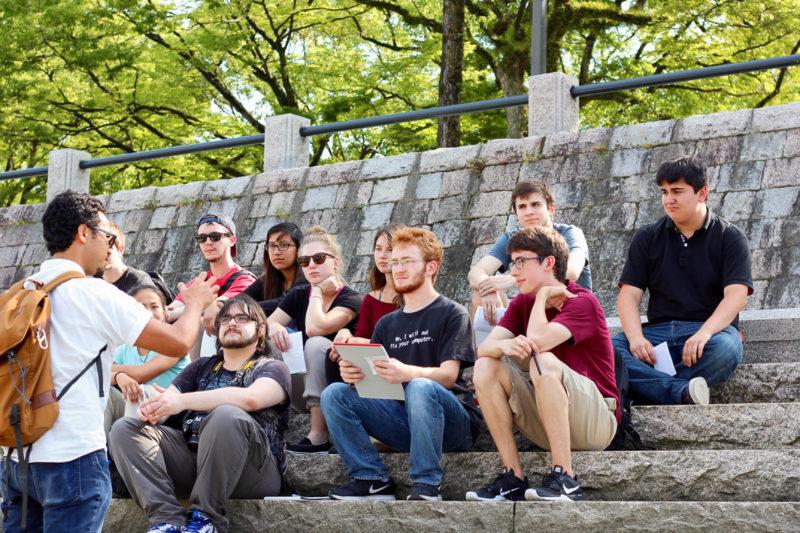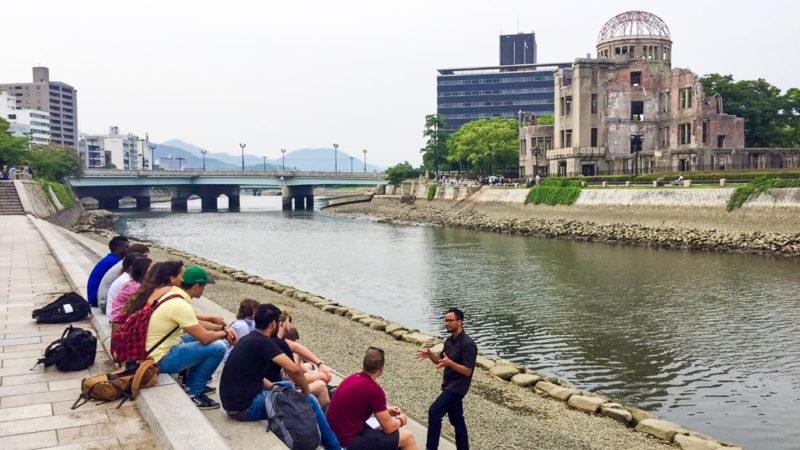Correction: This article originally stated that the political science department altered its policies regarding study abroad courses. It was only a coincidence that the courses that involved trips to Berlin and The Hague were offered for two spring semesters in a row. Via David Crockett, chair of the political science department: “The department chair has the authority to determine which courses will be offered every semester. Those decisions require balancing a variety of considerations, factoring in the appropriate number of lower and upper division offerings, accounting for faculty leaves and workload, and maintaining the ability to deliver the major. The article seems to imply that the department has made a policy change targeting study abroad courses, when in fact there is no policy as such, short of engaging in these balancing exercises every semester.”
Trinity’s political science department is leaving students with one less option for travel abroad this year. The change will most strongly affect seniors who were hoping to study abroad in Berlin this spring.
In the spring semesters of 2015 and 2016, the political science department offered two faculty-led study abroad courses: Global City Berlin and Criminal Justice: The Hague Program. Both counted as spring classes.
“In 2015, both Dr. Aloisi and I offered faculty-led study abroad courses “” hers to The Hague in the Netherlands, and mine to Berlin,” said Peter O’Brien, professor of political science. “They were very successful, so we repeated them in 2016. In 2017, Dr. Aloisi went on academic leave, so we offered one course. In the meantime, the department of political science decided to make some changes whereby we’re offering more four-credit courses, and that means that we teach fewer courses than we traditionally did.”
The office of academic affairs assessed this change and decided that one study abroad course per spring semester would be best for the department moving forward. As of now, the courses will alternate each spring. This coming spring, The Hague course will be offered and the department will offer the Berlin course again in 2019.
“The consequence for students who want to go on study abroad is that there’s one less course available from the department of political science,” O’Brien said. “Danny Anderson has stated that it’s our goal to increase the number of students going on study abroad from 40 percent to 60 percent by the time of graduation. How do you do that if you’re reducing the number of courses in study abroad?”
Katsuo Nishikawa, professor of political science and director of the Center for International Engagement (CIE), explained why the change occurred.
“We’re starting a new model and we have a limited number of faculty,” Nishikawa said. “We’re producing an educational experience. Either it’s the classroom, or it’s the classroom and study abroad. There’s lots of different forms of study abroad “” most of them are good, but some of them are on the light side when it comes to academics, and that’s something that we worried about. We want these experiences to be things that have lasting effect on our students. We know classrooms are effective “” if you don’t go abroad and you just come to our classrooms “” our Trinity grads are pretty good. As we branch out and try to do more, we have to be careful not to undercut what we do well, which is the classroom.”
Another reason for the shift in the political science department is that the study abroad program is in a period of experimentation, and new models are being tested.
“I’d love to see a day where two programs can go in the spring,” Nishikawa said. “My vision is that every student that wants to go abroad has that opportunity. Students who did not have the opportunity to go to Berlin should think about other opportunities. It’s also good for younger students to think about this, that these opportunities are sometimes there, sometimes not, and they should not postpone these kinds of experiences.”
Nishikawa highlighted the CIE’s participation grant, a need-based grant that students can apply for and use towards their study abroad experiences.
“We’re really working hard to get scholarships,” Nishikawa said. “We don’t want money to be an issue. We’re going to study what happens and see what is best for all students. That’s the decision that is going to come out of here. How do we help the students that want to go abroad at the same time that we help students that are here?”
Lorene Sugars, senior anthropology and art history double major, went on the Global City Berlin trip in the summer of 2016.
“I really wanted to have some sort of study abroad experience in Germany specifically while at Trinity, but due to the rigor of completing a double major and coming into Trinity with no credit hours, I couldn’t really see myself being able to be gone a full semester,” Sugars wrote in an email interview. “I heard about the faculty-led programs through the study abroad office and a few of my friends, learning that one was going to Berlin, and it would only take up three weeks of my summer made this class the perfect study abroad option for me.”
Sugars had not heard about the scheduling change until this interview was conducted.
“I think that offering biyearly would have its pros and its cons,” Sugars wrote. “Mainly, I think the big con is that it could limit the amount of people who can actually take the course, due to schedules and the way many majors are structured some students may not be able to take the class in the years it is offered while they are at Trinity, or may not hear about it in time to be able to. Yet, I can also see how offering it on a biyearly basis may be helpful towards planning the trip and changes to the itinerary of different outings and excursions.“
Students interested in study abroad at Trinity can find more information at gotu.us/studyabroad.








